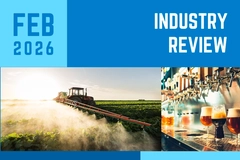
- Industry news
Industry news
- Category news
Category news
- Reports
- Key trends
- Multimedia
- Journal
- Events
- Suppliers
- Home
- Industry news
Industry news
- Category news
Category news
- Reports
- Key trends
- Multimedia
- Events
- Suppliers

20 Jun 2014 --- Tereos, the largest sugar producer in France and fifth largest in the world, has reported a ‘sound performance in an environment less favourable than in 2012/ 13’. The company reported a net profit of 176m Euros for the last year, with volume growth in sugarbeet, cereals and also sugarcane.
Alexis Duval, Chief Executive Officer of Tereos, declared: “Despite a less favorable environment after two years of exceptionally high world sugar prices, Tereos is reporting good results: an EBITDA of 691 million euros which is the third best performance in the history of the Group.

“This reflects Tereos’ strong assets to evolve in increasingly open and volatile markets. Our long-term strategy is designed to allow Tereos to remain among the most competitive producers in Europe and to take advantage of major drivers of growth thanks to our increasing international presence. This will enable us to seize opportunities both in our historic markets and in markets of emerging countries.”
Thierry Lecomte, Chairman of the Supervisory Board of Tereos, stressed the following: “Sugarbeet yields for the 2013-2014 campaign were in the low average of the past five years. But above and beyond these results, it is important to highlight long-term trends. Sugarbeet yields have been increasing regularly for years thanks to progresses in agronomy, agricultural practices and genetics.
Tereos has successfully experimented major innovations such as simplified sugarbeet sampling process and a new soil tare incentive system, which will be extended to all plants in the upcoming campaign. These are some of the factors which will be essential for our competitiveness going forward and which will enable us to operate in a more open market and without quotas.”
Highlights from the year include: successful experimentation of a simplified sugarbeet sampling process and a soil tare reduction plan, which will be extended in 2014 to all French sugar production units. Also, the launch of a plan to increase sugarbeet growing areas to enable a lengthening of the duration of the Artenay sugarbeet campaign by 15 days starting in 2014, with the stated objective of a 20% increase nationwide by the year 2017. In addition, the company embarked upon a major phase of the energy savings plan rolled out in 2013 in all French sugar production units aimed at a 15% reduction in energy consumption and a 20% reduction in CO2 emissions by 2016.
Also in the announcement, the company noted its development of the products portfolio of the Lillebonne unit, which expanded its activity to the production of proteins and sweeteners.
In Romania it logged an increase in sugarbeet yields, confirming the agricultural potential for the Ludus unit. It also said that the incorporation of the Haussimont potato starch cooperative will enable Tereos to support further the development of agricultural surfaces.
Innovations from the company include the start-up of the world’s first sugarbeet vinasse methanization unit in Artenay (Loiret) to produce biogas covering 50% of the energy needs of their distilleries, leading to a significant reduction in CO2 emissions. Tereos is strongly involved in Improve, a research platform devoted to promoting plant-based proteins.
In Brazil, 2013 proved to be a record crop for Guarani with bioelectricity production increasing sharply thanks to cogeneration. The new Palmital corn starch unit began operations in May.
In China, in partnership with Wilmar, the number one agro-industrial group in Asia, Tereos acquired a second starch unit, based in Tieling in Northern China. The Dongguan starch unit, located near Canton, will start production in end 2014.
In Indonesia, the leading economy in Southeast Asia, Tereos is entering this market through the acquisition of 50% of Redwood, the country’s sole corn starch plant.
Looking forward, the outlook is as follows:
Sugarbeet:
Production is expected to benefit from an increase in surfaces for the 2014/15 campaign. The simplified sugarbeet sampling process and the new incentive system to encourage improvements in the quality of the sugarbeet (reduction of soil tare, use of new varieties with higher sugar content) will be expanded to all French sugar production units starting with the 2014 crop. In addition Tereos will continue to foster discussions in the industry on the simplification of reception (measurement methods). The Group will continue its investment program aimed at reducing energy consumption and CO2 emissions. The methanization unit in Dobrovice (Czech Republic) should start its operations by the beginning of the next campaign; its biogas production covering 100% of the energy requirements of the distillery.
Sugar Cane:
In Brazil, the outlook for the current crop points to an increase in sugarcane volumes of around 4% (around 20.5 Mt). Volumes of bio-electricity are expected to continue to rise with the Tanabi cogeneration unit starting its operations. The Group continues to implement the Guarani 2016 competitiveness plan aimed at increasing agricultural and industrial production and developing bio-electricity from cogeneration.
Cereals:
In Europe, where the economic environment remains slow, the benefits of the Performance 2015 competitiveness plan will gather pace during the year. In Brazil, the Palmital unit will continue to ramp up production. In China, the Dongguan unit will start production during the second half of 2014. In Indonesia, the integration of Redwood is now underway with an operational improvement and product diversification plan.
Financial information:
The consolidated revenue of the Tereos Group stood at 4,697 million euros in 2013/14 (versus 4,920 million euros in 2012/13). At constant exchange rates, revenue was down 2% (-81 million euros) in a more difficult economic environment overall.
The downward trend in the Group’s revenue reflects the more sluggish economic conditions, especially in Southern and Eastern Europe, and falling sugar and ethanol prices in Europe. However, the Group benefited from investments made in the past few years, in particular through the increase in surfaces and record sugar cane yields in Brazil, as well as the increase in the amount of cereals processed (Marckolsheim and Lillebonne for Europe, Palmital for Brazil). Lastly, the Group benefited from the acquisition of the Ludus sugar production unit in Romania.
Adjusted EBITDA (before price complements) held up well at 691 million euros in 2013/14, compared with 794 million euros in 2012/13. At constant exchange rates, adjusted EBITDA was down 9% or 74 million euros.
Profitability was sustained by the operational performance of the sugar activities in Europe and the Indian Ocean, the increase in the amount of sugarcane processed in Brazil, and the initial positive effects of the competitiveness plan. Performance 2015 in Cereals Europe, as well as the improved performance of the Lillebonne unit. These factors made up in large part for the negative impact of falling sugar prices, starch & sweeteners’ margins affected by high cereal prices, the decline in the price of ethanol in Europe and start-up costs for corn starch facility in Brazil.
Net financial expense stood at 135 million euros, slightly down by 4 million euros compared with the prior year.
The Group’s net income stood at 176 million euros.
Net debt was down to 1,960 million euros as of March 31st, 2014, compared with 2,212 million as of March 31st, 2013.
The ratio of net debt to adjusted EBITDA was stable at 2.8x as of March 31st, 2014.













